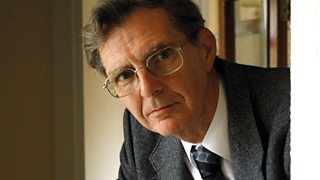Academics, poets and musicians unite in evening to mark RS Thomas' centenary
Polly March
Tagged with:
This year marks a century since the birth of the celebrated Welsh poet and priest .
Famed for his uncompromising and often stark representations of religion and the Welsh landscape, Thomas was also passionate about the Welsh nationalist cause and a fan of the visual arts.
On Thursday night the Dylan Thomas Centre in Swansea will play host to an evening of poetry and music and discussion to celebrate his contributions to the Welsh literary canon.
The event has been arranged with the help of the University of Wales Press and will include an appearance by the Swansea University professor M Wynn Thomas who will launch his latest book, RS Thomas: Serial Obsessive.
But Professor Thomas has also invited along friends, colleagues and fans of RS Thomas to share their thoughts and impressions about the distinguished literary figure.

M Wynn Thomas. Photo courtesy of the Welsh Books Council
The evening features Bangor University professor Tony Brown discussing the newly-released edition of RS Thomas' Uncollected Poems, which he has edited with Jason Walford Davies, as well as Christine Kinsey, who will give a brief illustrated discussion of RS Thomas' influence on her art.
There will also be specially commissioned contemporary responses to Thomas' work in poetry and music from Menna Elfyn, Peter Finch, Jeremy Hooker, Grahame Davies, Brian Breeze, Margot Morgan and others.
Professor Thomas, who is also the executor of Thomas' unpublished literary estate, told me that his book of essays attempts to encompass the wide range of the poet's obsessions and how they focused his attentions at different times in his life.
"The philosopher Isaiah Berlin said there are two creative minds, the fox who knows about everything and is very diverse and the hedgehog who knows a great deal about one thing," he said.
"The book is a reflection of my sense that RS was a hedgehog who focused on one thing at a time, profoundly and creatively, for a number of years before moving on to the next, much like Cezanne who in the last years of his life did nothing but paint the same mountain over and over again.
"But taken this way you can look at the range of RS's obsessions and you see him as a fox instead, varied and diverse and knowledgeable about many things.
"He was capable of focusing and bending his whole being to be concerned about something that totally possessed him – that's how he worked."
Themes that preoccupied Thomas' imagination for definitive periods of his life ranged from his struggle to find a place for himself in the Welsh national identity, his spirituality and his relationship to the landscape and humanity, often portrayed through his best-known character Iago Prytherch.
Professor Thomas examines each obsession in turn, questioning them to shed new light on Thomas’ collection of poems.
He told me: "We start with the figure of Iago Prytherch, who he has created because he is compelling and mysterious and who appears and disappears throughout his poems in different shapes and guises.
"He is not a recognisable human figure but an early means by which RS was battling with the puzzling contradictions of human nature and creation.
"Another preoccupation of his was his relationship with his immediate family, his mother, father, son and wife, and by the end of his life he had an extraordinary scattering of love poetry that arose out of a longstanding obsession with these personal relationships."
The book also touches on RS Thomas’ extremist views as a fervent Welsh patriot and his religious poetry, which for Professor Thomas is where his claim to greatness lies, as well as poems he created in response to various artworks, and his thoughts on impressionists and surrealism.
"Writing it is the result of my own obsession with RS Thomas, dating back 25-30 years," admitted Professor Thomas.
"He has been a continuing fascination of mine and the book reflects the cumulative attention I have paid him for several decades."
RS Thomas was seen by many as a Welsh ogre, hard-edged and gloomy but also spiritual to the last, passionate about Wales but distasteful of what that passion entailed.
For Professor Thomas, who interviewed him for various radio programmes and met him several times over the years, he was a different person entirely.
He said: "I often heard a version I didn’t recognise from others who had met him - he has been variously described as monstrous, awkward, a Victor Meldrew character, a grouch and some people even saw his views as bigotry, whereas I saw them as a challenge to Wales to find a better way of being.
"I found him a dryly witty man, a lonely soul, a shy man who didn't find socialising easy but he was kind and very good with women - they liked him and he liked them. We had quite a teasing relationship, which he seemed to appreciate."
When RS Thomas asked the professor to be executor of his unpublished work, he asked that only the poems Professor Thomas had absolute faith in be published.
Since his death in 2000, one posthumous collection has been published, as well as Professor Tony Brown’s latest collection which features poems that were scattered across periodicals RS Thomas contributed to throughout his lifetime.
But Professor Thomas says there are plans for more: "Another volume could be put together without compromising our agreement and perhaps another dedicated to his poetry about painting but there is no rush."
The celebration event takes place on Thursday 18 April at the Dylan Thomas Centre in Swansea from 7pm. Entry is free. Please contact the Dylan Thomas Centre on 01792 463980 or see for more information.
A series of events, new books and major projects to honour RS Thomas' legacy and work is planned throughout this centenary year. Up to date information can be found at .
Related links
